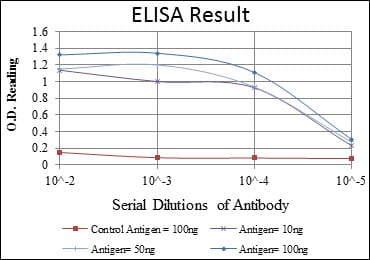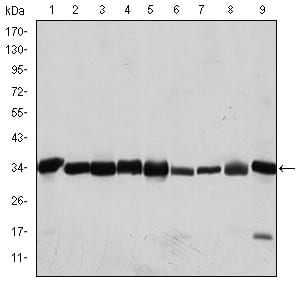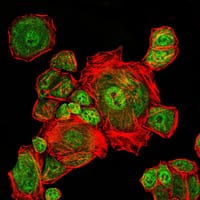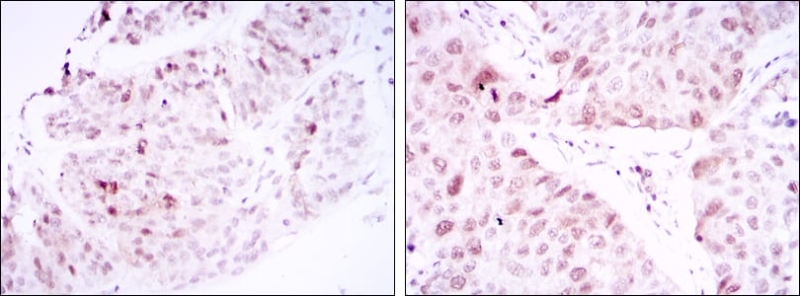



| WB | 1/500 - 1/2000 | Human,Mouse,Rat |
| IF | 咨询技术 | Human,Mouse,Rat |
| IHC | 1/200 - 1/1000 | Human,Mouse,Rat |
| ICC | 1/200 - 1/1000 | Human,Mouse,Rat |
| FCM | 咨询技术 | Human,Mouse,Rat |
| Elisa | 1/10000 | Human,Mouse,Rat |
| Aliases | CDC2; CDC28A; P34CDC2; MGC111195; DKFZp686L20222; CDK1 |
| Entrez GeneID | 983 |
| clone | 2G9 |
| WB Predicted band size | 34kDa |
| Host/Isotype | Mouse IgG1 |
| Antibody Type | Primary antibody |
| Storage | Store at 4°C short term. Aliquot and store at -20°C long term. Avoid freeze/thaw cycles. |
| Species Reactivity | Human,Mouse,Rat,Monkey |
| Immunogen | Purified recombinant fragment of human CDK1 expressed in E. Coli. |
| Formulation | Purified antibody in PBS with 0.05% sodium azide. |
+ +
以下是关于CDK1抗体的3篇参考文献及其摘要概括:
---
1. **"CDK1 is a potential therapeutic target for overcoming platinum resistance in ovarian cancer"**
*作者:Smith et al.*
该研究利用CDK1抗体通过Western blot和免疫组化技术,发现CDK1在铂类耐药卵巢癌细胞中高表达。抑制CDK1可恢复癌细胞对化疗的敏感性,提示其作为耐药治疗靶点的潜力。
2. **"Cyclin-dependent kinase 1 (CDK1) phosphorylation dynamics regulate cell cycle progression"**
*作者:Zhang et al.*
通过磷酸化特异性CDK1抗体,研究团队分析了CDK1在细胞周期不同阶段的活性变化,揭示了其Thr161位点磷酸化对驱动G2/M期转换的关键作用。
3. **"CDK1 antibody-based screening identifies novel inhibitors of hepatocellular carcinoma proliferation"**
*作者:Li et al.*
该文献报道了一种基于CDK1抗体的高通量筛选方法,用于鉴定抑制肝癌细胞增殖的小分子化合物。实验通过免疫沉淀验证化合物对CDK1激酶活性的抑制效果。
---
以上文献均涉及CDK1抗体的实验应用,涵盖疾病机制、细胞周期调控及药物开发等领域。如需具体期刊或年份信息,可进一步补充检索。
**Background of CDK1 Antibodies**
CDK1 (Cyclin-Dependent Kinase 1), also known as CDC2. is a critical serine/threonine kinase regulating cell cycle progression, particularly the G2/M phase transition and mitotic entry. It forms complexes with cyclins (e.g., Cyclin B1) to phosphorylate substrates that drive mitotic events, such as nuclear envelope breakdown and chromosome condensation. Dysregulation of CDK1 is linked to genomic instability, cancer, and developmental disorders.
CDK1 antibodies are essential tools for studying its expression, localization, and activity in cellular and disease contexts. These antibodies are widely used in techniques like Western blotting, immunofluorescence, and immunohistochemistry to detect CDK1 protein levels or post-translational modifications (e.g., phosphorylation at Thr161 for activation). Specific monoclonal or polyclonal antibodies target distinct epitopes, enabling researchers to differentiate CDK1 from other CDKs or assess its interaction partners.
In cancer research, CDK1 antibodies help evaluate its role as a prognostic marker or therapeutic target, as overexpression is observed in various malignancies. Additionally, they aid in studying CDK1 inhibitors in preclinical models. Validation of CDK1 antibodies involves testing specificity via knockout/knockdown controls and comparing molecular weights (~34 kDa) to avoid cross-reactivity. Overall, these antibodies are pivotal for unraveling CDK1's functions in cell cycle regulation and disease mechanisms.
×